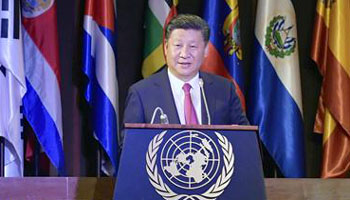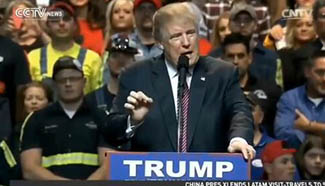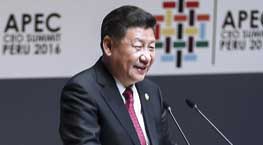by Lin Hao, Liu Tong
KUALA LUMPUR, Nov. 24 (Xinhua) -- As the new administration in the United States showing signs of turning inward, Malaysian officials and analysts said they hope China will play greater role in promoting free trade.
U.S. President-elect Donald Trump this week unveiled his first 100-day plan in office, topped by withdrawing from the Trans-Pacific Partnership (TPP).
Malaysia is likely to wait until the U.S. formally notifies the other parties that it does not intend to ratify the TPP, said Shahriman Lockman, a senior analyst at Malaysia's Institute of Strategic and International Studies, even though it is clear now that the 12-nation trade pact "is pretty much dead."
Malaysia has actively promoted TPP as it would provide the country with preferential access into four markets with which it currently does not have a Free Trade Agreement (FTA), namely the United States, Canada, Mexico and Peru.
Oh Ei Sun, a Malaysian analyst at Nanyang Technological University in Singapore, said a TPP without U.S. could still be viable in theory as it would account for more than one third of the global economy and trade volume.
But for Malaysia, a TPP without U.S. is much less attractive, because Malaysia sees the agreement as another chance at securing a preferential trade arrangement with the world's largest economy following the previous failure of negotiations for a bilateral FTA, Shahriman said.
What concerns Malaysia more is the anti-trade and anti-globalization sentiments looming in many parts of the world that would hamper trade growth, a bad news for trading nations like Malaysia.
With a population of around 30 million, Malaysia's limited domestic market could not generate enough demand to sustain economic growth, said Ong Ka Chuan, Second Minister at Malaysia's International Trade and Industry Ministry.
"Even a big market like the U.S. has to interact with China," he said during a recent interview with Xinhua.
Ong insisted that the trend of free trade remains "unstoppable", despite the sentiment behind Britain's decision to withdraw from the European Union and the election of economically-protectionist Trump as U.S. president.
HOPE ON CHINA
Malaysian officials said they would explore other options if TPP would not materialize, including negotiating bilateral FTAs with the other TPP members.
Currently Malaysia is focusing on the negotiation of the Regional Comprehensive Economic Partnership (RCEP), which involves 10 members of the Association of Southeast Asian Nations (ASEAN) and its six major trading partners in the Asia Pacific region, including China.
Another option may be a Free Trade Area of the Asia-Pacific (FTAAP) actively pushed forward by China during a recent meeting of Asia-Pacific Economic Cooperation (APEC).
The FTAAP process was launched at the 2014 APEC Economic Leaders' Meeting in Beijing with the endorsement of a roadmap. Subsequently, a "collective strategic study" was conducted, as agreed by APEC members, and the results should be reported to economic leaders by the end of 2016.
The FTAAP is not likely to go as far as the TPP in removing the "behind the border" barriers to trade, but it is now more crucial than ever, said Shahriman, the Malaysian analyst.
"There's a growth in anti-trade sentiments across the world and especially in the West. It's now up to China and other countries in the Asia Pacific to keep the momentum for freer trade alive," he said.
Meanwhile, China has shown great wisdom in pushing trade growth, said Ong. "Due to different economic level and national conditions among countries and regions, pushing for the liberalization of free trade blindly may backfire," he said.
On the other hand, with its advantages in infrastructure building and technology development, China has pushed for free trade by actively sharing experiences with partners and improving connectivity, said the Malaysian minister, adding that the "Belt and Road" Initiative represent a new direction for free trade.










